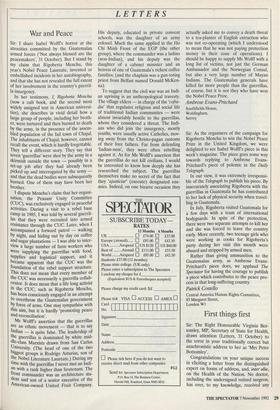LETTERS War and Peace
Sir: I share Isabel Wolff's horror at the atrocities committed by the Guatemalan armed forces (Not always blessed are the peacemakers', 31 October). But I stand by my claim that Rigoberta Menchu, this year's Nobel Peace Laureate, invented or embellished incidents in her autobiography, and that she has not revealed the full extent of her involvement in the country's guerril- la insurgency. In her testimony, I, Rigoberta Menchu (now a cult book, and the second most widely assigned text in American universi- ties), she describes in vivid detail how a large group of people, including her broth- er, were tortured and then burned to death by the army, in the presence of the assem- bled population of the bdl town of Chajul. The inhabitants of Chajul, however, cannot recall the event, which is hardly forgettable. They tell a different story. They say that seven 'guerrillas' were shot by the army in a Skirmish outside the town — possibly in a set-up job after they had already been Picked up and interrogated by the army — and that the dead bodies were subsequently burned. One of them may have been her brother.
I dispute Menchu's claim that her organi- sation, the Peasant Unity Committee (CUC), was exclusively engaged in peaceful activities. During a visit to a rebel base camp in 1985, I was told by several guerril- las that they were recruited into armed resistance through the CUC. Later, when I accompanied a forward patrol — walking by night, and hiding out by day on coffee and sugar plantations — I was able to inter- view a large number of farm workers who were supplying the guerrillas with food, supplies and logistical support, and it became apparent that the CUC was the foundation of the rebel support structure. This does not mean that every member of the CUC was necessarily a guerrilla collab- orator. It does mean that a life long activist in the CUC, such as Rigoberta Menchu, has been consciously engaged in an attempt to overthrow the Guatemalan government by force of arms. One may sympathise with this aim, but it is hardly 'promoting peace and reconciliation'.
Ms Wolff's assertion that the guerrillas are . an ethnic movement — that is to say Indian — is quite false. The leadership of the guerrillas is dominated by white mid- dle-class Marxists drawn from San Carlos University. (The head of one of the two biggest groups is Rodrigo Asturias, son of the Nobel Literature Laureate.) During my time with the guerrillas I never met an Indi- an with a rank higher than lieutenant. The front commander was an architecture stu- dent and son of a senior executive of the American-owned United Fruit Company. His deputy, educated in private convent schools, was the daughter of an army colonel. Much the same applied in the Ho Chi Minh Front of the EGP (the other group), where the commander was a ladino (non-Indian), and his deputy was the daughter of a cabinet minister and an heiress of one of Guatemala's richest coffee families; (and the chaplain was a gun-toting priest from Belfast named Donald McKen- na).
To suggest that the civil war was an Indi- an uprising is an anthropological travesty. The village elders — in charge of the `cofra- dia' that regulates religious and social life of traditional Indian communites — were almost invariably hostile to the guerrillas, whom they considered a threat. The Indi- ans who did join the insurgency, mostly youths, were usually active Catholics, mov- ing away from the Christo-pagan customs of their fore fathers. Far from defending 'Indian-ness', they were often rebelling against it. As for Ms Wolff's assertion that the guerrillas do not kill civilians, I would be interested to know how deeply she has researched the subject. The guerrillas themselves make no secret of the fact that they `ajusticiar' (execute) designated ene- mies. Indeed, on one bizarre occasion they actually asked me to convey a death threat to a tea-planter of English extraction who was not co-operating (which I understood to mean that he was not paying protection money in their zone of operations). I should be happy to supply Ms Wolff with a long list of victims, not just the German Ambassador and the Norwegian Consul, but also a very large number of Mayan Indians. The Guatemalan generals have killed far more people than the guerrillas, of course, but it is not they who have won the Nobel Peace Prize.
Ambrose Evans-Pritchard
Southfields House, Woldingham, Surrey










































































 Previous page
Previous page